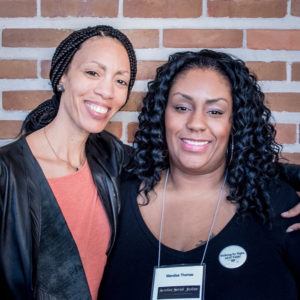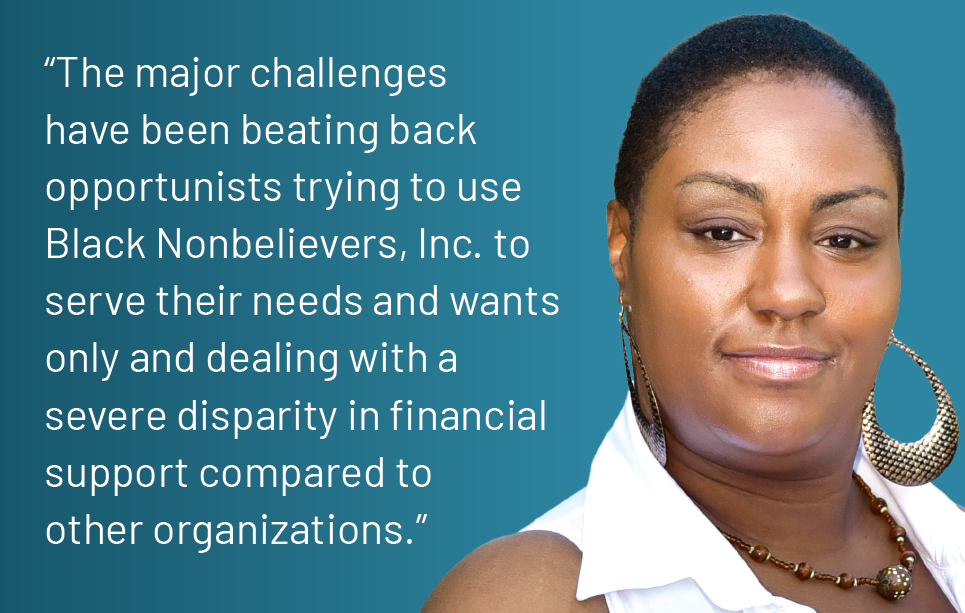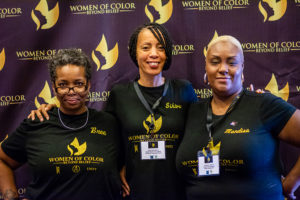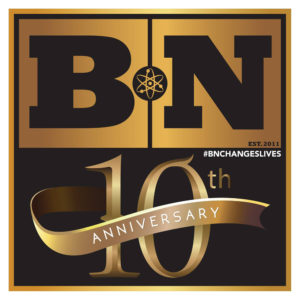Walking by Sight, Not Faith An Interview with Black Nonbelievers' Mandisa Thomas
 Sikivu Hutchinson (left) and Mandisa Thomas (right)
Sikivu Hutchinson (left) and Mandisa Thomas (right) Coming from historically religious African American communities, Black atheists are routinely marginalized and stigmatized. Although the number of Black religious “nones” is growing, self-identified Black atheists are approximately three percent of the atheist population. This reality exemplifies the steep cultural and social hurdles many Black folks in general, and Black women in particular, experience transitioning from religious faith. As the founder and president of Black Nonbelievers, Inc. (BN), the only national advocacy organization for Black atheists, Mandisa Thomas is a trailblazer in the secular movement. In 2020, Mandisa, writer and activist Ijeoma Oluo, and I received the Harvard Humanist of the Year award. Over the past decade, Mandisa has been one of the leading voices in atheist, humanist, and freethought organizing, pushing back against sexist, heteronormative religious dogma and discrimination in communities of color. Under Mandisa’s leadership, Black Nonbelievers has actively challenged racist exclusion in predominantly white, Eurocentric secular circles, spearheading unapologetically Black secular initiatives in affiliates across the nation. This year, Mandisa and BN celebrated the tenth anniversary of the organization with a virtual and in-person conference in New Orleans, featuring an array of Black secular speakers and allies.
Sikivu Hutchinson: What inspired you to found BN in 2011?
 Mandisa Thomas: The inspiration for creating BN was to bring together more Black atheists and religion doubters in the Atlanta area. While there were quite a few found in online spaces, it is more challenging to connect in person due to the still looming presence of religion within the Black community, as well as in the predominantly White secular community. After attending one such event and encountering almost the exact same challenges experienced by other Black atheists, it was decided right then that our entity was needed. We intended to only stay local to Atlanta but we’ve since expanded to a nationwide organization.
Mandisa Thomas: The inspiration for creating BN was to bring together more Black atheists and religion doubters in the Atlanta area. While there were quite a few found in online spaces, it is more challenging to connect in person due to the still looming presence of religion within the Black community, as well as in the predominantly White secular community. After attending one such event and encountering almost the exact same challenges experienced by other Black atheists, it was decided right then that our entity was needed. We intended to only stay local to Atlanta but we’ve since expanded to a nationwide organization.
Hutchinson: Are organizations like BN important for Black women and Women of Color in particular?
Thomas: BN and other secular organizations, especially that are spearheaded by women (Black in particular) are extremely important because:
- We are shifting the representation in our communities, and dispelling myths about nonbelievers in our communities;
- Black women and Women of Color often bear the responsibility of doing community work, with little credit to themselves; and it is time that this changes, through empowering more of us and overcoming the religious dogma that we have endured for so long;
- We tend to focus more on issues that pertain directly to our communities, especially racial and reproductive justice—much of which is exacerbated by the church and religion; and we have action-based missions without the notion that you need to believe in a god to do so;
- More Black women/Women of Color need to know that they CAN leave religion, as many are and have!

Bridgett “Bria” Crutchfield, Sikivu Hutchinson, and Mandisa Thomas, organizers of the 2019 Women of Color Beyond Belief Conference.
Hutchinson: What are some challenges that you’ve encountered and navigated over the course of your journey leading BN?
Thomas: Oh, I could go on about this for HOURS! But I would say that the major challenges have been beating back opportunists trying to use the organization to serve their needs and wants only and dealing with a severe disparity in financial support compared to other organizations. I have also encountered lots of male privilege and being undermined because those voices are still in the majority. And let us not forget the many sneers and dismissals regarding the need for Black/POC focused secular organizations.
There have also been personal attacks, “slut” shaming, and accusations of “tokenism”, primarily stemming within the Black atheist demographic. Finally, as with most volunteer organizations, we have seen that revolving door of people who initially step up to get involved, but do not maintain their presence and dedication, and eventually step away.
I am also a caregiver to my husband, who is terminally ill, and we have three children. And I was also working full time until 2018. So, balancing my home life with running the organization and dealing with said challenges has been remarkable, if I do say so myself.
Hutchinson: What advice would you give to African Americans who are struggling with their transition to non-belief?
Thomas: The most important thing to know is that you are not alone. And there are many of us who have been where you are. Leaving religion and god behind can be difficult, but ultimately, you have the strength and power to make that decision for yourself. But, please know, that support is available are waiting for you.
Hutchinson: What BN highlights/major issues and events are you most proud of?
Thomas: I could go on about THIS for hours as well! One of the major highlights was co-producing the Women of Color Beyond Belief Conference, along with Black Skeptics Los Angeles, and the Women’s Leadership Project, which debuted in 2019. I am proud of our “True Liberation” billboard campaign in 2020, which included our very first billboards as an organization. I am also immensely proud of our media features, including CNN (2011 and 2015), CBS Sunday Morning (2015), and Playboy (both in 2018). I always smile when I think of our many collaborations and projects, including contributing to Candace Gorham’s book The Ebony Exodus Project, and the Blackout Secular Rally, along with Black Atheists of America (both in 2013). But what I am most proud of is seeing the number of people who have expressed that their lives have been changed for the better by being a part of our organization–our community!
Hutchinson: What do you envision for BN in 2021 and beyond as we move into a new era with the Biden-Harris administration?
Thomas: I really want BN to continue expanding our outreach, as we already have through connecting with organizations like the Smithsonian’s National Museum for African American Culture, and the Religious Freedom Center. Both who have sought us out to be included in dialogue about religious freedom, and what it means for Black/POC communities. I also would like to reach the ears and minds of officials in the Biden-Harris administration, and establish where we can all work together on evidenced-based efforts for our communities, and fully recognize that religious freedom also includes acknowledging those of us who do not believe at all. I envision BN continuing our work for 10 more years and beyond.
For more information on the conference and BN’s work, check out Black Nonbelievers, Inc. – Walking by Sight, NOT Faith!

